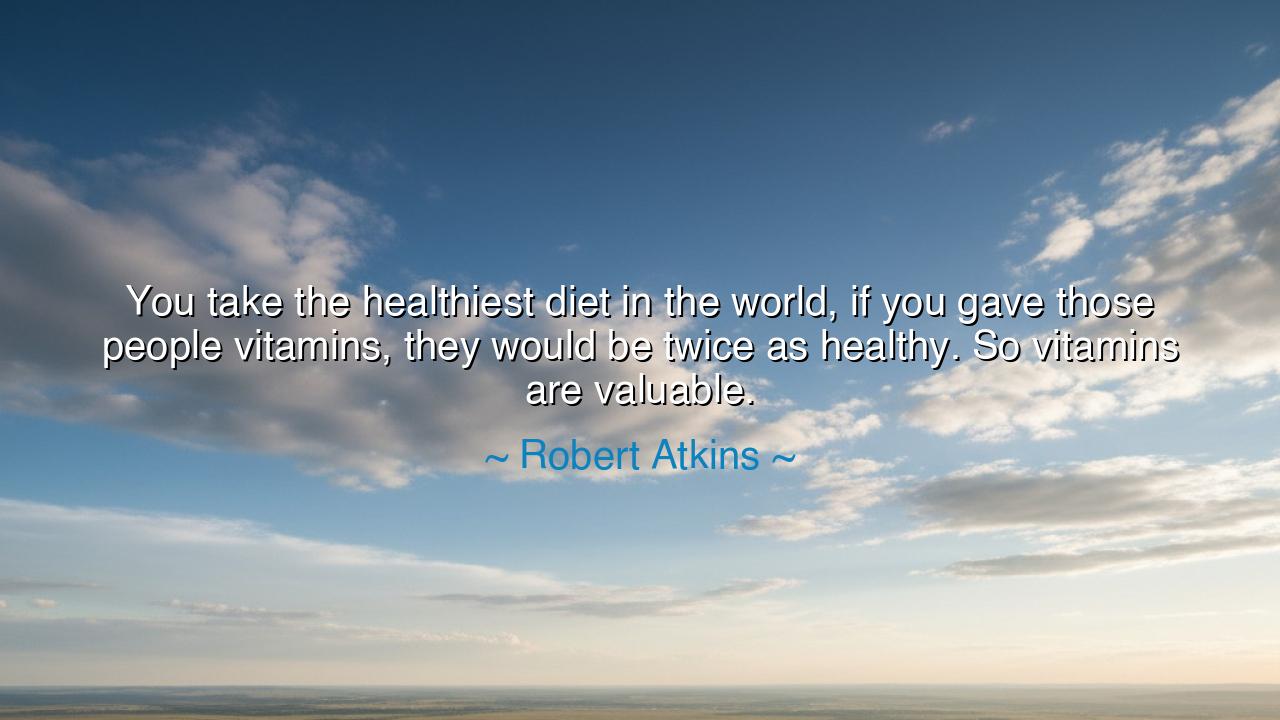
You take the healthiest diet in the world, if you gave those
You take the healthiest diet in the world, if you gave those people vitamins, they would be twice as healthy. So vitamins are valuable.






When Robert Atkins declared, “You take the healthiest diet in the world, if you gave those people vitamins, they would be twice as healthy. So vitamins are valuable,” he spoke as both a physician and a philosopher — one who understood that even nature’s perfection can be enhanced by wisdom. His words are not merely about nutrition; they are about completeness, the eternal human pursuit of balance between what is given and what must be learned. In his teaching, we hear the echo of an ancient truth: that knowledge perfects nature, and that even the purest life must be tended with awareness and care.
The origin of this wisdom lies in the work and legacy of Dr. Atkins himself — a man who revolutionized modern thought on health and diet. He challenged the assumptions of his time, urging people to look deeper than calories and fat, and to understand the body as a system of energy, chemistry, and renewal. When he speaks of vitamins, he speaks not just of substances, but of supplementation — the act of giving the body what life, time, or circumstance may have taken away. In a world where soil grows weary, air grows thin, and food is stripped of its ancient vitality, Atkins saw that the human being must learn to fortify the self, to rise beyond what is natural through the power of intention.
In the days of the ancients, this same truth was known in another form. The healers of Greece and Egypt, the physicians of China and India, all believed that the body possessed a sacred harmony — but that harmony required constant tending. The Greek physician Hippocrates, often called the Father of Medicine, prescribed herbs and minerals to restore what the earth or the body had lost. The Ayurvedic masters spoke of rasayana, the rejuvenation of the body through the essence of plants and minerals that carried the spark of life. What Dr. Atkins called “vitamins,” they called the elixirs of vitality. Their teachings, like his, were born from the same root — the understanding that to nourish is not enough; one must replenish.
Atkins’ words also carry a profound philosophical truth: that health is not a state, but a process — not a condition, but a pursuit. The healthiest diet may feed the body, but it may not fully arm it against the stresses of the modern world: polluted air, sleepless nights, anxious hearts, and weary soil. Thus, he teaches that supplementation — whether in the form of vitamins, rest, gratitude, or prayer — is not weakness, but wisdom. It is the recognition that the human being, though born of nature, must live consciously within it. To add wisely to what is already good is not greed; it is gratitude in action — the act of perfecting what has been given through care and awareness.
Consider the story of Sailor James Lind, an 18th-century Scottish physician in the British Navy, who noticed that sailors on long voyages grew weak, their gums bleeding, their bodies breaking down. The diet of the ship — salted meat, dry bread, and stale water — was enough to sustain life but not vitality. Lind gave these men lemons and oranges, and within weeks, they rose again with strength. From this act was born the understanding of vitamin C and the cure for scurvy. Like Atkins, Lind saw that the body, even when fed, could still be starved of essence. The addition of the smallest element — the unseen, the humble — became the key to life itself.
In this light, Atkins’ statement is both practical and metaphysical. It reminds us that the body, like the soul, can always be refined — that perfection is not a plateau, but a path. Even those who eat well, live cleanly, and breathe deeply can rise higher, if they add awareness to routine. The vitamin, then, becomes a symbol — not just of physical supplementation, but of mindful enhancement in all things. Just as we add vitamins to our food, so must we add kindness to our speech, purpose to our work, reflection to our days. For wisdom, too, is a nutrient — invisible but essential.
Thus, the lesson of Dr. Atkins is both scientific and spiritual. Do not settle for “healthy enough.” The human being was not made for sufficiency, but for flourishing. To thrive, one must learn to augment nature with wisdom — to give the body, mind, and spirit what they truly need, even if that need is subtle. Begin with what is good, but never cease improving it. Eat cleanly, rest deeply, breathe fully — but also supplement your life with learning, love, and reflection. These, too, are vitamins of the soul.
So, my children of health and hunger, remember: to nourish is divine, but to refine is greater still. The wise do not stop at sustenance; they seek elevation. For as Robert Atkins taught, even the healthiest among us can become twice as strong, twice as alive, through mindful enhancement. Let this truth guide you — to feed your body with purity, your mind with knowledge, and your heart with gratitude — and you will live not merely well, but abundantly, as nature intended and wisdom perfects.






AAdministratorAdministrator
Welcome, honored guests. Please leave a comment, we will respond soon